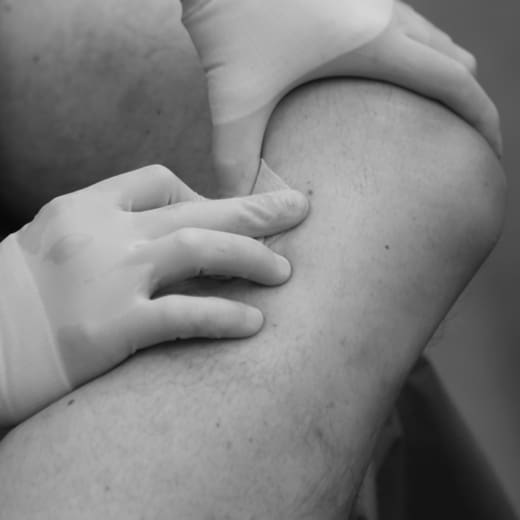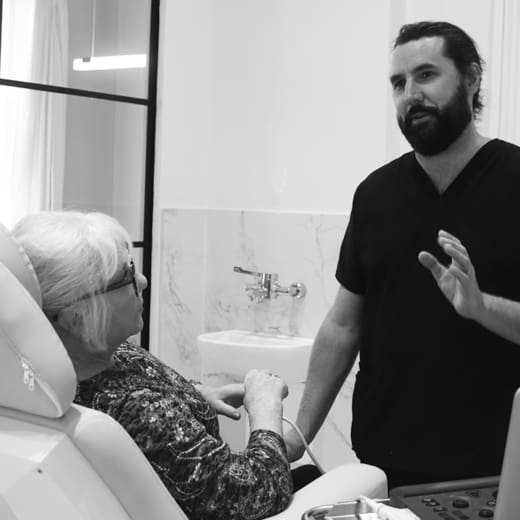McKeown Medical
167 Bath Street, Glasgow, G2 4SQ
Dr Alex Vesey is our expert consultant vascular surgeon who heads up our varicose vein team at McKeown Medical. Here, he discusses who is more prone to varicose veins.
Date posted — 26.08.24
Certain groups of people are more prone to developing varicose veins.
The first risk factor is genetics. Individuals with a family history of varicose veins are at higher risk due to genetic predisposition.
The next risk factor is age. As people age, vein elasticity decreases, increasing the likelihood of varicose veins.
The next risk factor is gender. Women are more likely to develop varicose veins due to hormonal changes from pregnancy, menstruation, or menopause, which can weaken vein walls – although men also commonly suffer.
The last big risk factor is obesity. Excess weight puts additional pressure on veins, increasing the risk of varicose veins.
We offer a range of treatment options for varicose veins, including VenaSeal™ – the most up-to-date method of treating varicose veins that causes less pain and allows you to get back to normal almost immediately, without the hassle of wearing bandages or compression stockings.
Get in touch with our friendly team, and we’ll help you find the right varicose vein treatment.

Dr Alex Vesey discusses whether varicose veins are dangerous.

Dr Alex Vesey discusses whether varicose veins are hereditary.

Varicose veins are enlarged, twisted veins that often appear just under the skin, primarily in the legs and feet.
1 / 3
2 / 3
3 / 3

Dr Alex Vesey discusses whether varicose veins are dangerous.

Dr Alex Vesey discusses whether varicose veins are hereditary.

Varicose veins are enlarged, twisted veins that often appear just under the skin, primarily in the legs and feet.
Last week marked a huge milestone for us at McKeown Medical.
Our first full lists of major surgical procedures - something we’ve been carefully building towards for several years - and I couldn’t be prouder of this team.
Led by Dr Kavita, we treated patients for breast augmentation (using both implants and fat transfer), breast reduction, uplift surgery and intimate female procedures, with every case approached thoughtfully, calmly and with meticulous care.
What meant the most to me wasn’t just the surgery itself - it was the experience our patients had.
Thanks to Dr Rob and his modern anaesthetic techniques, patients were comfortable, clear-headed and walking around within an hour of surgery - no nausea, no vomiting, just smooth recoveries.
Our wonderful nursing team cared for everyone before and after, and Lorraine kept the entire day running like clockwork behind the scenes.
Moments like this remind me why we’ve taken our time to grow these services properly. We could have rushed this process, but we’ve taken our time to get it right. I never wanted to simply add surgery to the clinic - I wanted to rethink how patients experience the surgical process.
We’re only just getting started, and I’m incredibly excited about what this means for the patients across Scotland and beyond who choose to trust us with their care.

As all of our patients know, the neck is the one part of the anatomy we always struggle to treat without surgery.
This patient underwent CoolSculpting to reduce some of the excess fatty tissue under her chin, followed by @sofwave.uk to tighten the skin. This is still early days for her, but we can see she is already well on her way to a great result.
When it comes to the neck, combination treatments are usually the answer to the best results.
What do you think?

We have an exciting new addition to the clinic - Visia skin analysis.
We’ve had a growing focus in the clinic on skin quality and skin health over the years with more and more investment in lasers and devices that improve skin quality as the foundation of what we do in aesthetic medicine.
The Visia is a great tool for helping us to analyse the skin and track progress of treatments over time. As well as doing a thorough analysis of all the components of sun damage and skin health, it also gives us an estimate of our ’true age’, which is a reflection of the condition of our skin compared with average for our age.
This is one of my own analysis images. It got my ’true age’ pretty much spot on with my chronological age, which is perhaps surprising given that I spent most of the 90s lying under a sun bed. What was interesting is that I scored really well on superficial pigment and redness, which is consistent with the fact that I love BBL and have a treatment a few times per year. I scored less well on deeper pigment and texture issues, which I guess is consistent with the fact that I’ve not had a Halo laser for nearly 4 years now. So I guess I will be booking another Halo for myself very soon!!!
We`re offering the Visia skin analysis free as part of our laser consultation process. If you`re interested in laser treatment, come in for a consultation with Dr Sharon and you’ll have your analysis done as part of planning your treatment strategy.
You’ll also be scanned again after your course of treatment so we can track your progress.
What do you think of this new addition to the practice?

I am very humbled to share these incredible reviews from our patients.
We are very fortunate to have a team who LOVE their work and will always go the extra mile to ensure our incredible patients are properly taken care of at every step of their journey with us.
We couldn’t do what we do without our incredible (and growing!) team and I am so proud of every one of them.
We have some very exciting developments on the horizon, so keep watching this space!

Laser eye rejuvenation! Thank you to our lovely patient for allowing us to share her photos, just one week after her laser eyelid rejuvenation.
Crepe skin, loose skin, wrinkles are all common signs of ageing around the eye which do not respond well to surgery. The optimal treatment for these problems is laser resurfacing - which is exactly what this patient had.
We’ve been performing these treatments in the clinic for several years, although I’ve recently modified the technique to achieve incredible results with less downtime.
What do you think?

Here’s another fantastic result from our phenomenally talented plastic surgeon, @bramhallplasticsurgery .
As we age, the eyebrows naturally descend which allows excess skin to fall into the upper eyelids. The two main surgical options to address this are a brow lift, an upper eyelid lift (upper blepharoplasty) or both, but for many patients the most appropriate option is also the simplest: to leave the brows exactly where they are and address the excess skin at the eyelids alone.
Upper blepharoplasty is a straightforward procedure with scars hidden in the natural eyelid crease, making them very hard to see once healed. Brow lifts are usually more involved, often require a general anaesthetic, and tend to create a more noticeable change to the face.
The aim with upper eyelid surgery is subtle improvement - looking fresher and more rested, without it being obvious that you’ve had anything done.
This 42-year-old gentleman had a bilateral upper blepharoplasty under local anaesthetic and is shown here six months after surgery.
What do you think?

With darker evenings and fewer social engagements, January is a great time to think about treatments which benefit from a little down time or those that will deliver their best results by spring.
Here’s Dr Darren with his top recommendations for treatments to have over the winter months, including Sofwave, HALO, full-field resurfacing and varicose vein treatment, all of which will deliver beautiful results in time for the weather getting better and social calendars filling up!
Which treatments are you planning?

Another year, another round of incredible transformations from our team at McKeown Medical!
Eye bags banished, jowls lifted, skin refined, veins gone. Thank you so much to all of our patients who have allowed us to share their photos with you and thank you to our incredible team who work so hard to take care of every patient who trusts us with their care.
Here’s to 2026 and another year of incredible transformations!

“But Daddies, WHEN is Santa coming? I want to wait up for him!”
Happy Christmas to all, and to all a good night 🎅🏻
